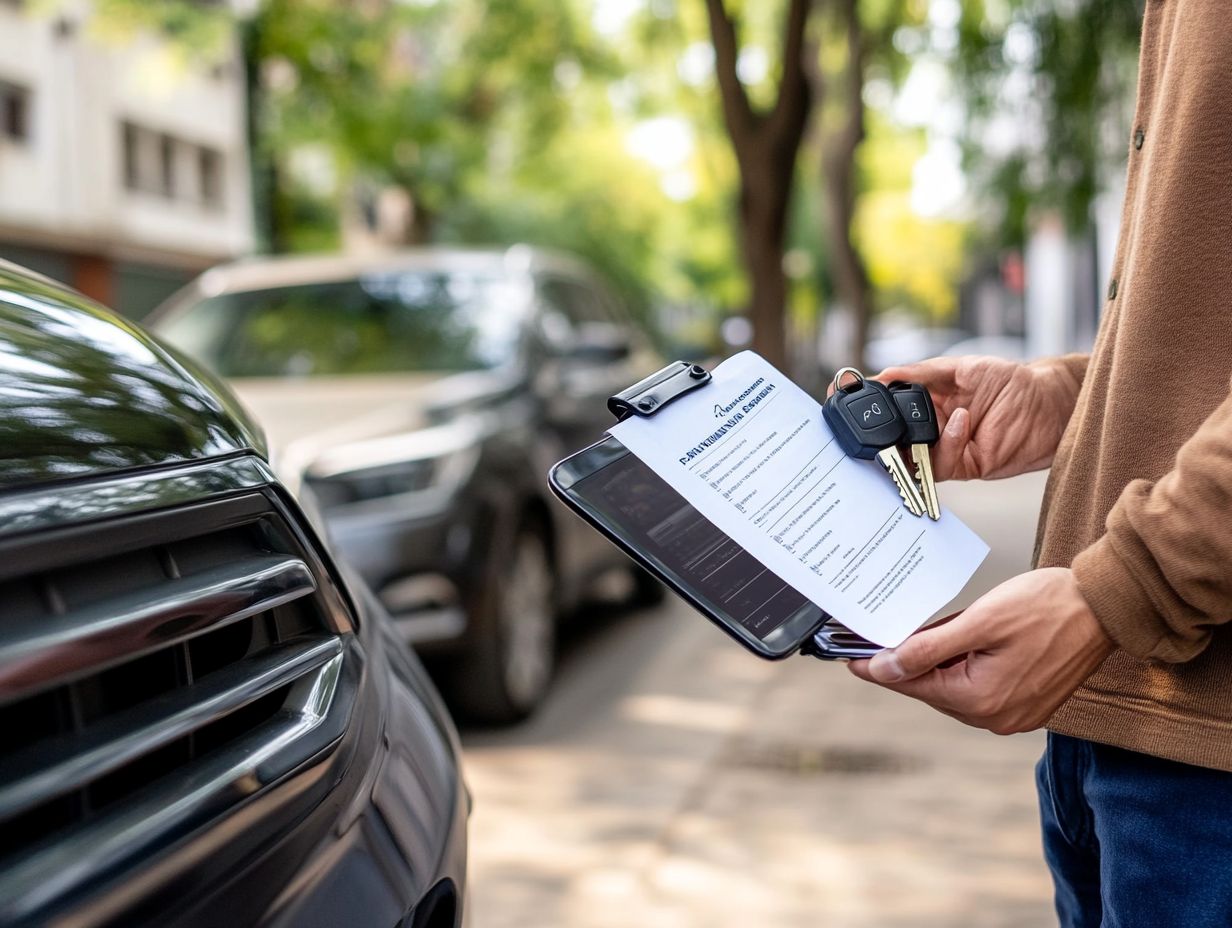Can You Transfer Insurance Between Cars?
Navigating the world of car insurance can feel overwhelming. Transferring policies adds another layer of complexity.
This article will clarify what a car insurance transfer entails, when it becomes necessary, and the critical factors to consider before making that switch. It will also guide you through the process step-by-step, addressing potential roadblocks you might encounter along the way.
Ready to make your insurance experience easier? Let’s jump in!
Contents
- Key Takeaways:
- Understanding Car Insurance Transfers
- Factors to Consider before Transferring Insurance
- How to Transfer Car Insurance
- Possible Roadblocks and Solutions
- Frequently Asked Questions
- Can you transfer insurance between cars?
- Can I transfer insurance from my old car to my new one?
- Do I need to inform my insurance company when I transfer cars?
- Is there a fee for transferring insurance between cars?
- Can I transfer insurance between cars if I switch insurance companies?
- What happens to my insurance if I transfer my car title to someone else?
Key Takeaways:

- Transferring car insurance between vehicles is possible but may come with certain restrictions and costs.
- When considering a transfer, it’s important to assess the coverage, limitations, and fees associated with the new policy.
- Transferring car insurance can generally be done by following a simple step-by-step process, but check with your insurance provider for specific guidelines.
Understanding Car Insurance Transfers
Grasping the details of car insurance transfers is essential for anyone who has just acquired a new vehicle or is contemplating a switch in insurance carriers. This process allows you to transfer your current insurance policy to a new car or switch it from one provider to another while following state rules and retaining the required coverages.
By navigating this correctly, you can preserve valuable benefits, such as a no-claim bonus, and potentially reduce your insurance costs. Understanding this aspect of auto insurance is not just beneficial it’s vital for making informed decisions.
What is a Car Insurance Transfer?
A car insurance transfer means moving your existing insurance policy from one vehicle to another. You might also switch it from one provider to a different one, allowing for a seamless transition for you as the policyholder.
To navigate this process smoothly, you ll need to follow specific steps to ensure all necessary coverages stay intact during and after the transfer.
- First, reach out to your insurance company or agent to kick things off and discuss any adjustments in coverage you might need for your new vehicle.
- Understand the types of coverage you need such as liability, collision, and comprehensive that could vary based on the vehicle’s value and intended use.
Gaining consent from the current policyholder is also crucial, as it protects both your interests and those of the provider. This ensures that the transfer adheres to regulations and prevents any potential coverage gaps.
When is it Necessary?
Transferring car insurance becomes necessary in many situations. For instance, this includes purchasing a new vehicle, switching insurance carriers, or updating your coverage options to align with new requirements.
These transitions often arise when you relocate to a different state, where varying laws can influence insurance regulations. Changes in personal circumstances, like a shift in marital status or alterations in your driving habits, may also necessitate adjustments to your coverage.
You should consider how these changes can impact your no-claim bonus. A lapse or modification in coverage could jeopardize those hard-earned discounts on your insurance costs. Conducting a thorough evaluation of how the transfer affects your overall premiums can help you avoid unwelcome surprises when it comes time to renew.
Factors to Consider before Transferring Insurance

Before you transfer your car insurance, it s essential to weigh several critical factors. Take a close look at the policy coverage limits, potential costs and fees, and the overall reputation of the insurance provider.
Each of these elements can significantly influence your insurance premiums and ultimately affect your financial peace of mind.
Contact your insurance provider today to explore your options!
Policy Coverage and Limitations
When considering a car insurance transfer, review the policy coverage options. This includes liability coverage, comprehensive car insurance, and collision coverage.
Each type serves a distinct purpose. Understanding these options can impact your financial security in case of an accident.
Liability coverage protects you from damages to others. Comprehensive insurance covers non-collision incidents like theft or natural disasters.
Collision coverage helps with damages to your vehicle after an accident. Assess your needs and familiarize yourself with your state’s insurance regulations.
Be aware of any coverage limitations. These can influence the claims process and may require updates to your policy.
Costs and Fees
Understanding costs and fees for a car insurance transfer is essential. These can vary greatly among different carriers and impact your overall premiums.
Watch for administrative fees that some providers may charge during the transfer. Your premiums might also increase due to your driving history or changes in local regulations.
Compare multiple insurance providers. This helps you find the most cost-effective option that meets legal requirements and secures a great financial deal.
How to Transfer Car Insurance
Transferring your car insurance is a careful process. Start by notifying your current insurance provider about your change.
Next, review new policy options that suit your needs. Finally, complete the required insurance documents for a seamless transition.
Step-by-Step Process

The process starts with researching and selecting a new provider that matches your coverage needs and budget. Then, initiate the policy transfer.
To make an informed choice, compare various insurance companies. Review their ratings, customer service experiences, and available discounts.
Request quotes from multiple providers to gauge pricing. This helps identify the best coverage options for your situation.
Once you choose a provider, contact them to understand the transfer requirements. Gather necessary documents like cancellation forms and proof of prior coverage.
Using your past claims history can aid in negotiations. This gives you leverage for better terms based on your track record.
Possible Roadblocks and Solutions
Transferring car insurance is usually straightforward. However, challenges like lapsed coverage or transferring your policy to a different state may arise.
Act quickly to tackle these challenges and stay compliant with insurance regulations.
Issues with Lapsed Coverage
Issues arising from lapsed coverage can significantly complicate your car insurance transfer process. This may impact your eligibility for certain coverages and discounts.
When your coverage lapses, you may face higher premiums. Insurers often perceive this as a greater risk. Losing your no-claim bonuses can also result in a considerable financial setback. This could cost you hundreds of dollars in increased rates.
It s crucial to quickly understand your insurance requirements and the implications of any gaps in coverage. By comprehending these factors, you streamline the transfer process and ensure that you don t inadvertently jeopardize your ability to secure optimal protection and competitive rates in the future.
Transferring to a Different State
Transferring your car insurance to a different state requires careful navigation through varying insurance regulations. It s essential to familiarize yourself with your new state’s specific requirements, including documentation related to the unique number assigned to your vehicle.
Beyond grasping the legalities, you may find that coverage options and minimum liability amounts can differ significantly from what you were accustomed to in your previous state. This necessitates a comprehensive review of your existing policies, along with necessary adjustments to ensure compliance with local mandates.
The complexities increase with the need for updated insurance certificates that accurately reflect your new registration. Consulting with an insurance agent is vital; they can provide personalized guidance, helping you avoid potential pitfalls and ensuring compliance with the laws in your new state.
Frequently Asked Questions

Can you transfer insurance between cars?
Yes, you can transfer insurance between cars, provided both vehicles are insured under the same policy and have the same coverage options.
Can I transfer insurance from my old car to my new one?
Yes, you can transfer insurance from your old car to your new one. Just contact your insurance provider and provide them with the necessary information about the new car.
Do I need to inform my insurance company when I transfer cars?
Yes, it is important to inform your insurance company when you transfer cars. They need to update your policy and ensure that your new car is properly insured.
Is there a fee for transferring insurance between cars?
It depends on your insurance provider. Some companies may charge a small fee for transferring insurance, while others may not have any fees at all. It’s best to check with your provider to be sure.
Can I transfer insurance between cars if I switch insurance companies?
Yes, you can transfer insurance between cars even if you switch insurance companies. However, you may need to cancel your current policy and purchase a new one with the new company for the new car.
What happens to my insurance if I transfer my car title to someone else?
If you transfer your car title to someone else, the insurance for the car will also need to be transferred to the new owner. This can usually be done by contacting your insurance provider and providing them with the new owner’s information.






